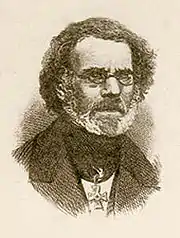Marie-Félicité Brosset
Marie-Félicité Brosset (January 24, 1802 – September 3, 1880) was a French orientalist who specialized in Georgian and Armenian studies. He worked mostly in Russia.
Marie-Félicité Brosset | |
|---|---|
 | |
| Born | January 24, 1802 Paris, France |
| Died | September 3, 1880 Châtellerault |
| Nationality | French |
| Signature | .svg.png.webp) |
Biography
Marie-Félicité[1] Brosset was born in Paris into the family of a poor merchant who died a few months after Marie-Félicité's birth.
Early life and first works
His mother destined him to the Church. He attended the theological seminaries in Orléans, where he studied Greek, Latin, Hebrew, and Arabic.
Back in Paris, he attended lectures delivered at the Collège de France by Carl Benedict Hase (Greek), Antoine-Isaac Silvestre de Sacy (Arabic) and Jean-Pierre Abel-Rémusat (Chinese). He was elected to the Asiatic Society in 1825. Eventually, says his son Laurent, "after five years of unceasing effort, he suddenly gave up" and burned all the material he had painfully built.[2]
From 1826 he devoted himself to the Armenian and Georgian languages, history and culture. He had found his true vocation. However, books, teachers, documents were scarce. For Armenian he was helped by Antoine-Jean Saint-Martin.[3] For Georgian he had to create his own dictionary from the Georgian translation of the Bible, which was faithful to the Greek text.
Russia
Invited to Saint Petersburg in 1837 by Count Sergey Uvarov, president of the Imperial Academy of Sciences, he was elected a member a year later. He journeyed to the Caucasus in 1847-48. He translated — and commented on — all major medieval and early modern Georgian chroniclers and published them in seven volumes from 1849 to 1858. His magnum opus, Histoire de la Géorgie, was a long-standing authority on the history of Georgia.[4] He also published the correspondence between the czars and the kings of Georgia from 1639 to 1770.[5]
He devoted the years 1861–1868 mainly to his series on Armenian historians, but continued to work on them until 1876.
Overall, Brosset wrote over 250 works on Georgian and Armenian history and culture.
He left Russia in May 1880 et and retired at his daughter's in Châtellerault. He died there a few months later, September 3.[6] His son Laurent's analytic bibliography was a major contribution to the knowledge of his life and works.
Works
Lists of works
- Brosset, Laurent. Bibliographie analytique — 271 titles, not counting supplements. Alphabetical index: p. 585-704
- "Liste des travaux de M. Brosset", p. 1, at Google Books in Bulletin de l'Académie impériale des sciences de Saint-Pétersbourg. Vol. 27, 1880, p. 1 — 237 titles
List of online works
- Around a hundred titles (doubles included) can be found on Google books.
Selected works
- (1837) Éléments de la langue géorgienne at Google Books. Paris: Imprimerie royale — Reprint: Osnabrück: Biblio, 1974, LVI, 366 p. ISBN 3-7648-0194-8
- (1848–58) Histoire de la Géorgie depuis l’Antiquité jusqu’au XIXe siècle at Google Books, 7 volumes, Saint Petersburg, 694 p.
- Introduction et tables des matières at Google Books, 1858
- Histoire de la Géorgie depuis l'Antiquité jusqu'au XIXe siècle, Introduction, CCXIV p., and Tables of contents, XCVI p., Saint Petersburg: Académie impériale des sciences, 1858.
- Volume 1 Histoire ancienne, jusqu'en 1469 at Google Books, 1849
- Histoire de la Géorgie depuis l'Antiquité jusqu'au XIXe siècle at Google Books, Partie 2: Histoire moderne. Livraison 2, 1857
- Additions et éclaircissements à l'histoire de la Géorgie depuis l'Antiquité jusqu'en 1469 de J.-C. at Google Books, Saint Petersburg: Académie impériale des sciences, 1851, 494 p.
- (1851) Rapports sur un voyage archéologique exécuté dans la Géorgie et dans l'Arménie en 1847-1848 sous les auspices du Prince Vorontzof Lieutenant du Caucase, p. PP9, at Google Books, Saint Petersburg: Académie impériale des sciences, 64 p.
- (1860–61) Les ruines d’Ani, capitale de l'Arménie sous les rois bagratides aux Xe et XIe siècles, 2 volumes, Saint Petersburg Online.
- (1862) "Analyse critique de la Всеобщая история de Vardan", p. 1, at Google Books in Mémoires de l'Académie Impériale des Sciences de Saint-Pétersbourg, vol. 4, issue 9, 30 p.
- Collection d'historiens arméniens: dix ouvrages sur l'histoire de l'Arménie et des pays adjacents du Xe au XIXe siècle, reprinted by APA-Philo Press, 1978 ISBN 9060223489.
Notes and references
- Then as now two first names for a female. In Russia he was often called Марий Иванович Броссе, Marius Ivanovitch Brosset.
- L. Brosset, 1887, p. IX
- Saint-Martin died of cholera in 1832 during the second pandemic. Brosset, who loved him much, wrote his obituary.
- "Brosset's Histoire was a sensational breakthrough. But from our vantage a century and a half later, it is not without shortcomings. Today we know that Brosset's edition is based exclusively upon a few MSS of the Vaxtangiseuli recension. We can hardly fault Brosset on this point [...]" Rapp, Stephen H. Studies in medieval Georgian historiography: early texts and Eurasian contexts, p. 31, at Google Books, Peeters Publishers, 2003 ISBN 9789042913189
- Bibliographie analytique, p. 370
- His death in registre des décès de Châtellerault de 1880, vue 84 sur 119, acte n°326.
- Bouatchidzé, Gaston. La Vie de Marie Brosset, Nantes: Éditions du Petit Véhicule, 1996, 195 p. ISBN 2842730003 (in French)
- Brosset, Laurent (1887). Bibliographie analytique des ouvrages de Monsieur Marie-Félicité Brosset (1824-1887). Saint Petersburg: Imprimerie de l'Académie impériale des Sciences. Retrieved 10 November 2013. (Written by his son Laurent Brosset; includes a biography) (in French)
- Khintibidze, Elguja. Georgian literature in European scholarship (in English)
- Rapp, Stephen H. Studies in medieval Georgian historiography: early texts and Eurasian contexts, Peeters Publishers, 2003, 522 p. ISBN 9789042913189 (in English)
- Шилов, Л. А. Броссе Марий Иванович – Detailed biography, Russian National Library (in Russian).